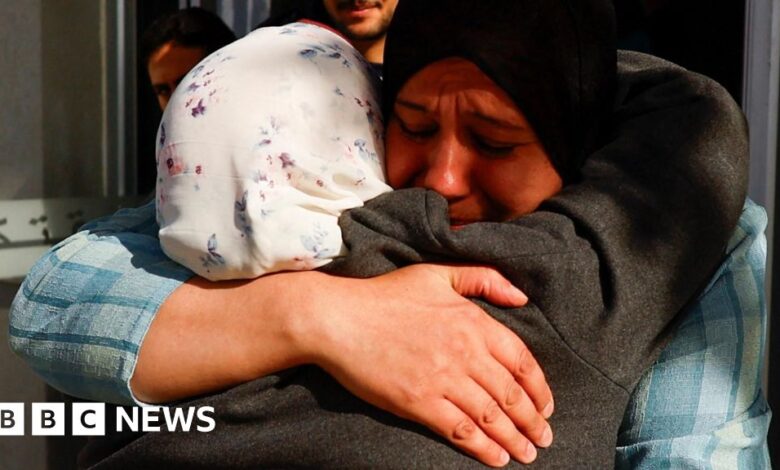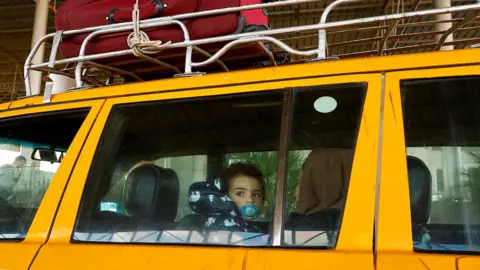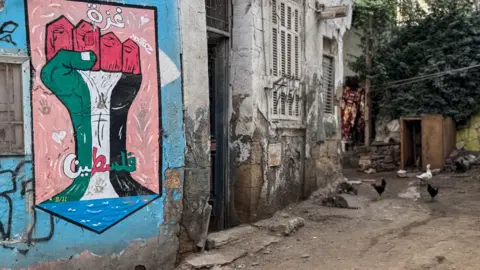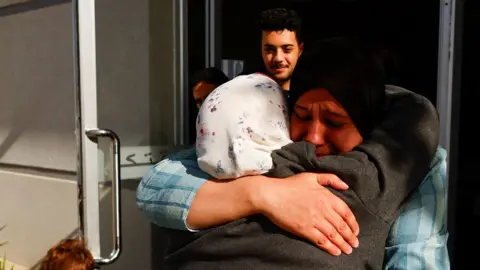Exiles fled Gaza to live life in limbo

 REUTERS/Ibraheem Abu Mustafa
REUTERS/Ibraheem Abu MustafaIt has been 10 months since my family left Gaza but we continue to live with the loss, the pain, the impact of war in all its painful details.
This month – on the eve of the anniversary of the start of the conflict – we witnessed eight hours of the most suffering we have ever experienced in its time.
We received a video message from my wife’s cousin in Gaza, saying: “Tanks are surrounding us and shooting at us. These could be the last moments of our lives.
“Pray for us and do whatever it takes to save us.”
My wife collapsed, even unconscious: her uncle, aunts and their families – a total of 26 people – were all attacked.
Israeli attacks and advances on cities and villages across Gaza – targeting Hamas – have been common for most of this year.
We didn’t hear anything from them for several hours. They were being bombarded the whole time. Then, finally, a voice said: “Four people have been injured. Your aunt Wafaa is bleeding, her condition is very critical.”
I made countless calls to the Red Cross, the Palestinian Red Crescent, anyone who could help.
After eight hours, the Israeli army finally allowed them to evacuate and move the wounded on foot.
But it was too late for Wafaa – she succumbed to her injuries shortly after arriving at the hospital.
We still have a lot of relatives in Gaza. My father was there, living in a tent in the southern city of Khan Younis, which was bombed again this week.
I often felt guilty calling him from Istanbul, where I had fled with my wife and two children.
There are so many people like me, in Türkiye, Egypt and further afield around the world – UK, US, Europe – where we have to go to find safety.
Not everyone can go out, only those who have enough money to pay high fees to go elsewhere.
But in Egypt alone, more than 100,000 Gazans have crossed the border south into the country since November.
 EPA
EPAThey are not under direct threat from Israeli bombs. But many people are struggling to feed their families, provide education for their children and reestablish the basics of a normal life.
In a bustling, outdoor cafe in Cairo’s Nasr City, dozens of newly arrived refugees gather in small groups, smoking hookahs, sharing stories about their homeland.
They are trying to ease the pain of longing for those who are not currently with them. They cling to the hope that the war will soon end, that they can return. But there is always a constant worry.
A loud traditional Palestinian song plays over the speakers – a hit by Palestinian singer Mohammed Assaf, who won the Arab Idol competition a few years ago.
“Go through Gaza and kiss its sand. Its people are brave and its men are strong.”
Abu Anas Ayyad, 58, was among those who sat and listened. In his previous life, he was known as the “Pebble King,” a successful businessman who specialized in providing building materials for construction projects across Gaza.
He and his family – including four children – escaped. But: “Every rocket that hits a building in Gaza breaks my heart.
“I still have family and friends there,” he said.
“All of this could have been avoided. But Hamas has a different view.”
He regretted the attack by the Iran-backed group in Israel on October 7, 2023 and the current consequences.
“Despite my love for Gaza, I will not return if Hamas remains in power,” he said. He did not want his children “to be used as pawns in a dangerous game played by reckless leaders for the benefit of Iran.”
Sitting nearby is Mahmoud Al Khozondr, who before the war ran his family’s famous hummus and falafel shop in Gaza. It’s a territorial institution – known for its cuisine and celebrity clientele. The late Palestinian President Yasser Arafat was a regular customer of the restaurant.
Mahmoud showed me photos of his family’s previous fully furnished house on his phone. They now live in a cramped two-room apartment. His children cannot go to school.
“It was a miserable life,” he said. “We lost everything back home. But we must rise again,” he said.
We need food for children and support for the people in Gaza.”
Living in exile in Egypt is not easy. Authorities have allowed Palestinians to stay temporarily, but they have not granted official residence. They limit access to education and other important services.
 REUTERS/Ibraheem Abu Mustafa
REUTERS/Ibraheem Abu MustafaMany Gazans try to send money back to support relatives still in Gaza – but remittance fees are high and merchants during the war get a 30% cut.
“It is heartbreaking to see profits being made from the suffering of our loved ones,” Mahmoud Saqr told me.
He used to own an electronics store in Gaza. These days he has to carry a wad of cash to a store in Cairo to transfer money to his sister.
“There was no receipt, no proof—just a text a few hours later confirming they had received the money,” he told me, describing the process.
“It’s risky, because we don’t know who is involved in this transaction but we have no other choice.”
These are desperate times for everyone.
During the past year in Türkiye, I tried in vain to create a peaceful living environment for my family.
But every time we go to a restaurant, my children reminisce about their favorite places in Gaza, the big house, the game store, their friends at the pony club, their classmates.
Some of those classmates were killed in Israeli airstrikes, and the airstrikes continue.
But since October 7, time has stood still for us. We have not moved on since that day.
We may have escaped physically, but our souls and hearts remain attached to our loved ones in Gaza.





